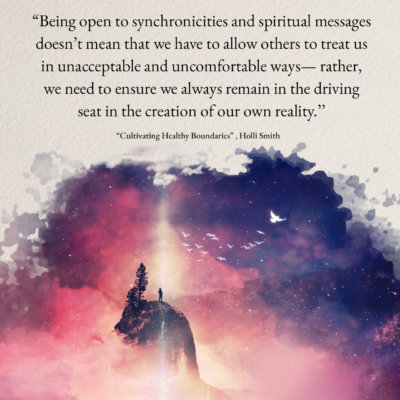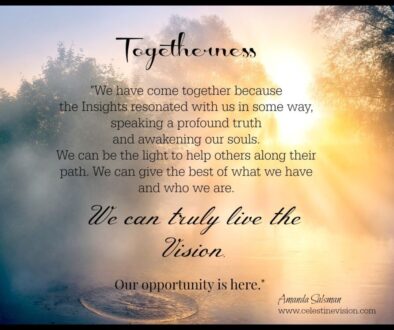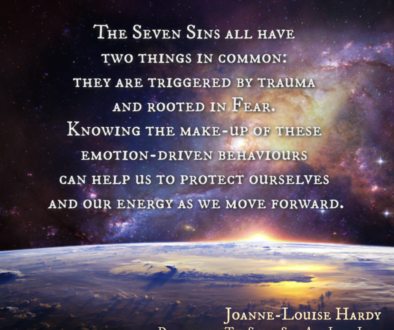Cultivating Healthy Boundaries
 Creating and maintaining healthy boundaries is a life skill. It requires a confidence that allows us to feel as though we deserve to be respected, and though it seems many of us are born with it, often it slowly wanes over time. As our childish innocence falls to the side, we try to figure out who to be, how to be, and what to believe.
Creating and maintaining healthy boundaries is a life skill. It requires a confidence that allows us to feel as though we deserve to be respected, and though it seems many of us are born with it, often it slowly wanes over time. As our childish innocence falls to the side, we try to figure out who to be, how to be, and what to believe.
The trust we have in ourselves dwindles as we become more insecure and vulnerable to judgements, made both by others and ourselves, which in turn causes us to give our power away. We struggle to understand our value, to find a clear path to acceptability in the world around us. The constant bombardment of ‘look this way’ and ‘talk that way’ threatens to undermine creativity and self expression, while the access we have to each other’s personal lives gives free rein to an overwhelming amount of unsolicited advice.
Despite that, our boundaries are still there, hidden within us, waiting only for the time when we will recognize them. When we bring them into consciousness we start to believe that it’s okay to have them. We all know what lines we want others to respect and value, no matter how adept we are at enforcing them.
We allow ourselves to get lost in the chaos surrounding us—whether we’ve had a hand in creating it or not—and berate ourselves for not being up to the impossible task of meeting everyone else’s expectations. So often, guilt, at the very thought of telling people no, stops us in our tracks.
Something as simple as telling our loved ones that we don’t want to be touched, talked to, or interrupted seems too bold, too rude. But is it?
When we consider the repercussions of allowing others to push and take without relief, we are worse for it. And have less to give, both to ourselves and to our community. There is no joy in a person who has no say in their own life. And without joy there can be very little love to share. We inadvertently give control to whoever is willing to take it, all the while perhaps taking the same from others in the name of trying to help them.
So, what do we do? How do we get back to a place where we know that it is our right to determine how we exist and what we are willing to accept?
There is so much information available in this time, and so many different lifestyles to choose from. Now, possibly more than ever before, we are able to truly live a life that we design. One that gives us meaning and purpose, where we feel like we are truly living from our hearts and souls.
Through practices such as meditation and journaling we are able to dig deep, explore our wants and needs, and uncover the set of boundaries that is perfect for us. Given that we are the ones culpable for the lives we create, it’s about time that we started doing so.
One of the greatest gifts we can give is to be our authentic selves, living our best lives out loud and without shame. Living from that space, we inspire people in a way we never could if we allowed the world at large to dictate us into becoming people pleasers. And, we all know from experience that the people we admire the most are the ones that are just themselves, and allow others to be the same; the ones who respect themselves and others in deep and heartfelt ways.
This can be a scary thing to do, and we must acknowledge that there is often a lot of fear that must be overcome. We may not want to face confrontation and conflict, or to make strained relationships even more tumultuous. We can also get caught in the trap of feeling like we should be able to go with the flow in life, and learn from all that is presented to us.
Although, being open to synchronicities and spiritual messages doesn’t mean that we have to allow others to treat us in unacceptable and uncomfortable ways—rather, we need to ensure we always remain in the driving seat in the creation of our own reality. Part of living with intention is claiming our power and living in ways that are loving towards the self.
We’ve all been guilty of letting others push us around and take too much. We’ve all felt the pain and anger of having our boundaries trampled. It can be hard to understand how people can treat us badly, so disrespectfully, especially if they are or were loved ones. Yet, very few of us can claim to have never stepped on toes or pushed in where we didn’t belong.
It is human nature to give and take, and we all fail occasionally as we strive to find balance. And that’s okay. It is not only understandable but reasonable to expect that we will not always be successful at maintaining our boundaries, or respecting those of others.
It’s when unhealthy patterns develop that we must get more serious about starting the sometimes tough, but honest discussions that will allow us to navigate our way out of those habits. As silly as it may feel to schedule conversations, it’s ideal to set aside time so that everyone involved is calm, focused and has intentionally thought over what they might want to share.
Genuine inner reflection will also show us where we may be the ones not respecting boundaries. And it is our responsibility, both to the other party and to ourselves, to do something about it. Encouraging our loved ones, including our children, to take personal responsibility and implement their own boundaries is a vital part of healthy, upward spiral relationships. We can be an example for others by not taking their power (even when it feels like they’re trying to force us to) and by claiming full responsibility for our own lives.
As our confidence in maintaining our own boundaries grows through awareness and practice, so too will the overflow. Our loved ones won’t be able to help but treat us differently, because we will be different. The entire dynamic of our relationships will change as a result.
At the end of our lives, as we look back on all that we accomplished, all who we have loved, and all that held meaning in our hearts, there will be very little room for guilt over having put up boundaries for our own wellbeing, but there could be a lot of regret if we don’t.
Meditation/journaling questions to consider:
My Boundaries:
- What relationships feel off balance?
- Where am I feeling insecure and/or unsupported?
- Where am I feeling disappointed in myself and reliving conversations and interactions?
- What do I admire most about others, real and fictional, in terms of how they handle conflict, difficult situations, etc?
- In an ideal world, what would my relationships with others—family, friends, co-workers, etc. look like?
- How can I support my loved ones in understanding my autonomy and boundaries?
- What control dramas do I fall into when stressed?
- What views/past traumas/triggers are influencing how I’m seeing this situation?
- Where do I feel like I’m settling for less than I want or deserve?
Others’ Boundaries:
- Who do I feel I overshadow or have ‘control’ over?
- Are there people I treat in ways that I feel guilty about after the fact?
- Which judgements do I make that I wouldn’t like others to make about me?
- About whose life do I often think “If I was them…” or “If only they would…”?
- Where am I not showing others the level of respect that I feel I deserve?
- How can I support my loved ones in developing their own autonomy and boundaries?
- What control dramas do the people around me fall into when stressed?
- Where do I feel people need to step up and take more control in their own lives? Do they agree, and if not, why do I believe they need to do this?
A useful exercise within a social/familial group (where each member is inspired to create a healthier, happier life) is to do a roundtable brainstorming session about boundaries and what they mean to each person. We can then, without pointing fingers at each other, share times when we ourselves have disrespected boundaries—our own and those of our loved ones.
This is an insightful way to get a bigger picture perspective without falling into arguments about who did what to whom as we will only be holding ourselves accountable. It creates a safe space where we can hear other people’s perspectives on situations, as well as discover things that we may resonate with but were unconscious of.
As we explore and experiment further, we will build our own map: A beautiful, though often messy, layering of lines that we acknowledge and accept, understanding where each individual’s personal responsibility and boundaries lay.




